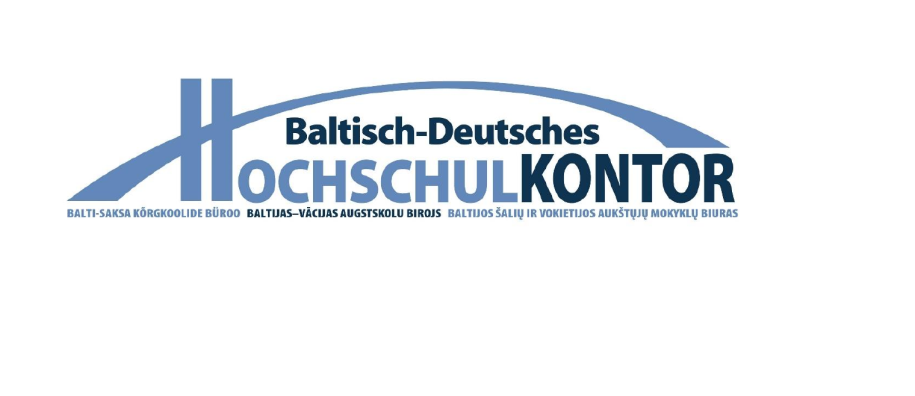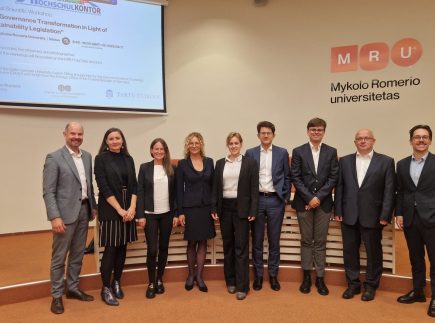
Sustainability has moved from aspiration to obligation. This was the underlying message of the International Scientific Workshop on Corporate Governance Transformation in Light of Recent Sustainability Legislation, held at Mykolas Romeris University in Vilnius on 17 September 2025. The event, supported by the Baltic-German University Liaison Office, brought together academics from Germany, Estonia, and Lithuania to examine how new laws are reshaping corporate governance and what tensions emerge between compliance, competitiveness, and accountability.
The workshop opened with remarks by Ieva Pranka, Executive Director of the Baltic-German University Liaison Office, who underlined the purpose of the project to strengthen Baltic-German scientific relations, linking sustainability with company law. Assoc. Prof. Dr. Jolanta Apolewicz, Vice-Dean for International Relations at MRU, framed the day by reminding the participants that sustainability is now “legal responsibility backed by compliance requirements,” not just voluntary good practice, and posed the central questions: how can firms integrate these duties without undermining competitiveness, and how should directors balance shareholder obligations with wider responsibilities?
Session I: Recent Legislative Developments focused on new legal initiatives and began with Tonio Friedmann (Martin-Luther University Halle-Wittenberg), who set the stage with a detailed review of Germany’s Lieferkettensorgfaltspflichtengesetz (Supply Chain Due Diligence Act). He traced its origins to tragic incidents such as the Rana Plaza collapse and the Karachi factory fire, which revealed the limits of voluntary corporate responsibility.
The Act, adopted in 2021, applies to companies with over 3,000 employees from 2023 and over 1,000 from 2024. Its obligations include risk management systems, human rights officers, annual risk analyses, preventive and remedial measures, complaints procedures, and reporting. While broad in definition, duties toward indirect suppliers are triggered only when firms have “substantiated knowledge” of violations. Enforcement rests with the Federal Office for Economic Affairs and Export Control (BAFA), though the law deliberately excludes new avenues of civil liability.
Friedmann concluded that Germany chosed a pragmatic, risk-based approach: “Companies do not have to take all conceivable measures, but only those that are necessary and reasonable.” Still, he noted, the Act will be amended to align with the EU Corporate Sustainability Due Diligence Directive (CSDDD).
Prof. Dr. Lyra Jakulevičienė (MRU) placed the discussion in the global context, focusing on the United Nations Guiding Principles on Business and Human Rights (UNGPs). Adopted in 2011, they remain the only authoritative international framework, structured around three pillars: state duty to protect, corporate responsibility to respect, and access to remedy.
Jakulevičienė emphasized that human rights due diligence has become the global norm of expected conduct. Effective implementation requires impact identification, meaningful stakeholder engagement, preventive and remedial measures, prioritisation of the most severe risks, and transparent communication.
Her warning targeted current EU “simplification” efforts: proposals to limit liability to first-tier suppliers, reduce stakeholder engagement, or dilute due diligence frequency risk undermining alignment with UNGPs. “Simplification, if it continues as proposed, might result in fragmentation rather than simplification,” she cautioned.
Assoc. Prof. Dr. Andres Vutt (University of Tartu) followed with a deeper analysis on the balance between simplification and sustainability regulations, questioning whether ambitious legal reforms risk creating more problems than they solve. While supportive of the goals of sustainability, he warned that regulatory radicalism can backfire: “Too often, radical changes in regulation create unintended problems, new costs, may distort business priorities, and they may even produce the opposite results.”
He pointed to the Corporate Sustainability Reporting Directive (CSRD) as a well-intentioned initiative that risks becoming an excessive compliance exercise. Instead of driving emission reductions, companies may focus on filling templates. Vutt argued for minimalist lawmaking, cost-effective rules, and trust in market mechanisms, insisting that uniform solutions across diverse EU legal cultures are unrealistic.
Session II shifted the focus to the implementation challenges and legal frameworks of sustainability regulation. Prof. Dr. Anne-Christin Mittwoch (Martin-Luther University Halle-Wittenberg) opened the debate by evaluating two years of Germany’s Supply Chain Act in practice. She focused on how enforcement has unfolded in practice, pointing to the Federal Office for Economic Affairs and Export Control (BAFA) as the central authority. While procedures exist on paper, she noted limited resources, difficulties in monitoring indirect suppliers, and uncertainty about how far obligations reach in complex supply chains. As Prof. Mittwoch put it, “We have a gap between the law on the books and its practical use — instruments are in place, but they are not always applied in the way the legislature envisaged.” This gap shows that effective enforcement remains just as crucial as the design of the law itself. Building on this enforcement perspective, the discussion shifted to how national legal frameworks themselves are evolving.
Prof. Dr. Lina Mikalonienė (MRU) turned to the Lithuanian developments, outlining how sustainability concerns are being woven into company law. She highlighted that in Lithuania the regulatory approach is to not redefine the corporate purpose which is understood under an enlightened shareholder value approach, but is to use other solutions. She noted that all companies must adhere to general standards of justice, reasonableness, and good faith in their activities, as well as a general duty of care not to cause harm to others. She also pointed out that, in addition to open standards, there are certain statutory sustainability-related obligations in the context of corporate governance, that essentially stem from EU directives applicable to large and listed companies. Mikalonienė concluded that "the main belief is that dominating SMEs will voluntary focus on responsible business practices".
Kateryna Varava (MRU) then examined the EU Omnibus Package, which seeks to ease compliance by raising thresholds, narrowing scope, and postponing aspects of the CSRD while also watering down certain obligations and requirements under CS3D. She noted that “what is presented as simplification may, in fact, reduce reliability and comparability of information, undermining the original purpose of sustainability reporting.” The presentaion stressed that weakening these frameworks risks undermining the EU’s comparative advantage as a global standard-setter in sustainability regulation. What is needed instead is a synergy model that aligns sustainability frameworks with industrial policy, positioning the EU to strengthen competitiveness while fulfilling its climate obligations and meeting new emerging commitments. The message was clear that sustainability regulation should be treated as the foundation of Europe’s long-term economic and competitive resilience.
Dr. Pawel Mazur (MRU) closed the session by mapping the broader landscape: competing policy priorities (climate vs. defence), geopolitical uncertainty, and the danger of “compliance fatigue.” He called for careful design of obligations to avoid discrediting sustainability itself, stressing that “there is no one size fits all solution for every jurisdiction… when discussing corporate purpose and sustainable corporate governance, we need to take into consideration specific market situations in various countries.”
The final session shifted from system-wide frameworks to the emerging challenges faced by specific groups of companies, particularly startups. Giedrė Čiuladienė (MRU) explored how sustainability duties affect startups. She distinguished between early-stage firms, scale-ups, and growth companies, stressing that compliance pressure varies across these categories mostly indirectly. As she explained, “In terms of ESG regulations, early-stage startups are typically considered as micro undertakings and often lack the resources to implement these requirements. However, voluntarily adopting ESG principles can open access to a broader range of funding opportunities, including sustainability-focused investors. It can also facilitate integration into larger supply chains, ultimately providing a competitive edge.”
The discussion then moved to directors’ responsibilities under Lithuanian law, where Prof. Dr. Virginijus Bitė (MRU) examined how courts may approach director’s liability in the context of sustainability. He considered whether directors might face direct claims from third parties for sustainability failures, noting that while current director’s liability rules focus on internal liability towards the company, courts would be reluctant to impose oversight liability on directors over third parties. The main difficulty will be in proving causality and individual/direct damage. As he put it, “We cannot require directors to be Superman… but to implement a diligent system, to take care about this and then monitor… and ensure that the company and its employees follow the law.”
From directors’ duties, the discussion moved to the broader shift in corporate accountability. Tomas Stundys (MRU) traced the evolution from voluntary corporate social responsibility to legally enforceable supply chain liability. As he explained, “what due diligence tries to create is some kind of rules that we can follow… if risk actually emerges into harm, then we look at who was responsible for it, and if the parent had the duty to oversee, the parent is the one who is liable, because the parent failed to manage the subsidiaries in a particular way.”
The workshop revealed both convergence and conflict. Participants agreed that this topic could not be more timely. However, they broadly diverged on how far and how fast sustainability regulation should go. For some, mandatory due diligence and reporting are essential to level the playing field and prevent harm. For others, excessive rules risk creating “parallel worlds” of paperwork and undermining trust. Laws exist, but their impact depends on enforcement, proportionality, and meaningful engagement.
The challenge now is to strike the balance: ambitious enough to meet urgent environmental and human rights goals and realistic enough to sustain competitiveness.
